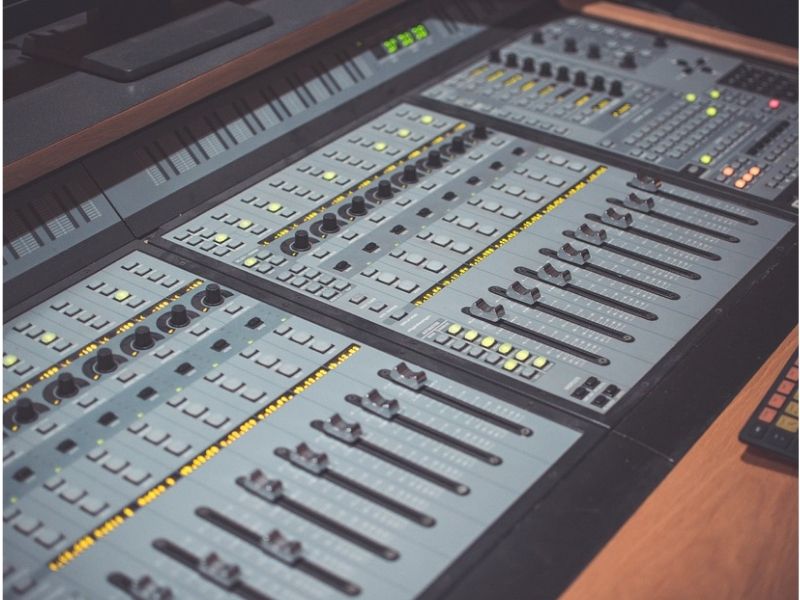The essence of a sound recordists job is to detect minutiae which are unnoticed by the untutored ear and to utilise hi-tech equipment to give crystalline clarity to recorded sound.
With the pervasive growth and development of the electronic media there is a continuously rising demand for sound engineers and sound recording professionals. Consequently, this 21st century profession is attracting youngsters with keen ears and technical expertise, by the droves.
Sound engineering also known as audio engineering is the technical knowledge of sound and recording so that sound besides being intelligible instantaneously is also preserved for future generations. Sound is an integral component of the entertainment industry and Mumbai and other metros are full of recording studios fitted out with the latest hi-tech equipment capable of reproducing high-quality sound. The essence of a sound recordists job is to detect minutiae which are unnoticed by the untutored ear and to utilise hi-tech equipment to give crystalline clarity and timbre to recorded sound.
A sound engineers expertise is required in all professions connected with voice and music recording. Sound engineers can make or break live music performances, radio jingles, advertising, record albums, television, theatre, and movies. Even though the basic skill-sets required in this vocation are common across all mediums, specialisation is required in each medium.
Recorded sound can be broadly classified into film and playback recordings, music recorded for videos, cassettes etc, and speech reproduction. The recordist has to continuously adapt hi-tech equipment to the needs of a particular stream of sound. For instance, to record sound on film location, a recordist has to possess a higher degree of engineering knowledge than while working in the controlled environment of a studio.
Sound recording/engineering education is usually offered as a three-year diploma course to graduates in physics/electronics at:
Film and Television Institute of India, Pune
Institute of Film Technology, Adyar, Chennai
Satyajit Ray Film and Television Institute, Kolkata
Mumbai University
School of Audio Engineering Institute at Mumbai, Bangalore, Chennai, New Delhi, and Thiruvananthapuram
Audiophile Institute of Sound Engineering, Kochi
The Film and Television Institute of Tamil Nadu, Chennai
Admission is on the basis of performance in admission tests. Shorter duration certificate courses are also offered by several less-known institutes.
Since the basic principles of sound are based on the laws of physics and maths equations, most institutes demand the study of physics up to class XII. However, a lot of people without a science background have also entered this field and created a niche for themselves. But over and above formal qualifications, the most important qualities a sound engineer/recordist must have are a good ear for music, the spoken word, and familiarity with contemporary hi-tech sound recording equipment and processes.
A professional sound recordist/engineer could work as a production mixer, boom operator, production sound assistant, sound transfer operator, sound editor, music editor etc. Moreover, these days its common practice for famous music artistes to bring their own recordists to studios, which is very rewarding both financially and in terms of exposure. A sound engineer could also become an acoustic consultant, designing the acoustics of studios, theatres, auditoriums, conference halls etc.
EVOLVING INDUSTRY. As the music and entertainment industry is experiencing boom conditions, a sound professional with the right aptitude and experience can dictate his fees. Remuneration tends to be performance based and after a few years experience it can escalate to Rs.40,000 to Rs.50,000 or even a lakh per month. Moreover, those employed in studios are offered a certain amount of commission on the basis of the clients that they introduce. A sound engineer can freelance as well. Success is entirely dependent upon his drive, yen to absorb the latest technology, specialisation, and quality of work.
A sound recordist with a lot of byte is Rajiv Kenkre (43), whos recorded albums for vocal music stars likes Asha Bhonsle, Alisha, Hariharan, Remo Fernandes, Gary Lawyer, and even classical greats like Zakir Hussain and Pandit Bhimsen Joshi among others. Kenkre has also mixed the sound for several ad jingles (thats where the money is”), managed the sound of live shows all over India, including those of the famous Colonial Cousins, and recorded the sound track for feature films such as Ketan Mehtas Oh darling yeh hai India and Pankaj Parashers childrens films.
Not one to follow the beaten path, after acquiring a B.Sc. (physics) degree from Mumbai University in 1983, Kenkre passed the entrance exam of FTII, Pune, and enrolled in the institutes three-year sound recording/engineering programme. After completing two years at FTII, in 1985 Kenkre returned to Mumbai and started working with Rajesh Jhaveri of Digital Domain at his Rave Studio. Subsequently, he acquired considerable experience of advertising jingles while working with top-rung musicians like Louis Banks and Vanraj Bhatia. Ive specialised in music recording and for the last 14 years Ive been recording jingles and albums. Theres more money, greater experimentation and greater challenge in mixing sound for jingles as you have to make an impact in 30 seconds,” says Kenkre.
According to Kenkre, to be a successful sound recordist/engineer one must be able to strike a balance between love of music and science. In music recording you need to have a keen ear for music. With new technology and computer-based equipment, the line between the sound recordist and a composer is very thin and the switchover is happening. And thats where the excitement and challenge lies. Today the medium dictates the art. You can now use technology to write a new language of music,” enthuses Kenkre.
With the mushrooming of studios and the current media boom, there are great opportunities for sound engineers who are much in demand. This is the best time to enter this profession. At the moment, however, theres a lot of mediocrity and to rise above that you have to put in a lot of hard work, exhibit talent, and develop a good musical ear. I would advise new entrants into this field to first work in studios, hone their skills, and then freelance,” says Kenkre.
